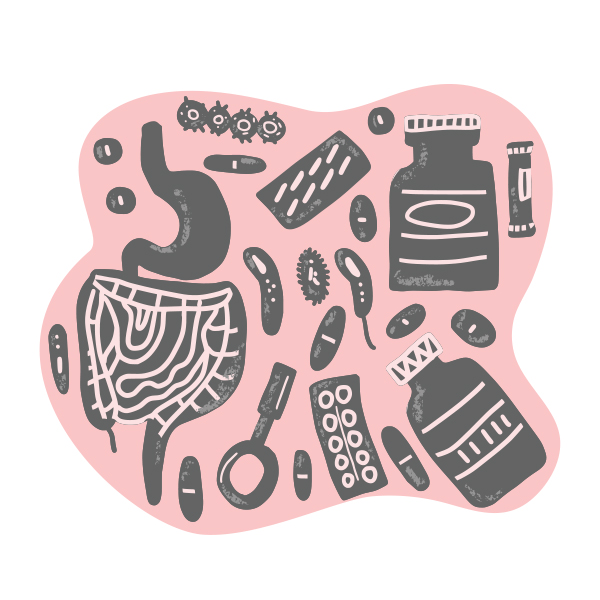Bacteria make you sick. The idea that bacteria cause illness has become ingrained in modern society, made evident by every sign requiring employees to wash their hands before leaving a restroom and the frequent food recalls resulting from pathogens like E. coli. But a parallel idea has also taken hold. As microbiome research continues to reveal the important role that bacteria play in human health, we’re starting to see the ways that the microbiota of the human body may be as important as our genes or environment.

The story of how our microbiome affects our health continues to get more complex. For example, researchers are now beginning to understand that the composition of bacteria residing in your body can significantly impact the effects of therapeutic drugs. This is a new factor for optimizing drug response, compared to other considerations such as diet, interaction with other drugs, administration time and comorbidity, which have been understood much longer.
The real complexity arises in the myriad ways that bacteria can affect a drug. For example, some bacteria may produce an enzyme that converts a drug compound into a new molecule, often resulting in a reduction of potency. The new molecule can be chemically inactive or no longer absorbed by the target tissue.
Interactions between bacteria and the immune system can pose special challenges for researchers and doctors employing immunotherapy to treat cancer, which can have response rates as low as 12%. The microbiome may be to blame in many cases. For example, anti-PD1 immunotherapy yielded very different response rates in patients with melanoma depending on the characteristics of their microbiome. Patients with certain species present in their gut had better response rates than those without them.
The question that remains is how the bacteria are influencing the drug action of immunotherapies. In addition to producing molecules that act directly on drug compounds, there are a number of other mechanisms through which bacteria can impact an individual’s response to immunotherapy.
Bacteria could play a role in training or priming the immune system. If certain bacterial antigens are similar to tumor antigens, the immune system can gain the molecular tools and memory needed to fight cancer. Individuals without such bacteria would have an immune system naïve to the cancer antigens, giving a tumor more time to fly under the radar and gain mutations that further evade the immune system.
Response rates to immunotherapy in mice have been shown to decrease if treatment was preceded by a course of antibiotics. When the mouse microbiome was disrupted, the number of immune cells declined. This resulted in a decline in tumor necrosis factor (TNF) production. TNF is needed to enable CpG-oligodeoxynucleotides, the type of immunotherapy used in this study, to induce tumor necrosis. Mice that weren’t treated with antibiotics had a greater reduction in tumor size from the treatment. Left undisturbed, their microbiome appeared to prime the immune cells to secrete TNF.
In another mouse study, treatment with tumor specific CD8+ T cells was more likely to work if the mice were irradiated first. The radiation irritates the lining of the gut, freeing bacteria to travel to other parts of the body. Once the microbes establish themselves in a destination, they produce lipopolysaccharides that stimulate immune cells in the vicinity. The researchers also found that gut microbes promote dendritic cell maturation which activate CD8+ T cells and induce them to kill tumor cells.
You may be thinking these examples just reveal a few drugs that are affected by the microbiome, but one study shows that bacterial influence on drug action is probably the rule rather than the exception. After testing nearly 300 drug compounds, one group of researchers found that two-thirds were modified by bacteria in some way. The fact of the matter is that bacteria are responsible for most of the molecules found in our bloodstream, which must be taken into account when measuring drug efficacy.
The key to boosting the success rate for immunotherapy and drug treatments for cancer and many other diseases probably lies in a cotreatment targeting bacteria in the gut. Probiotics, prebiotics, fecal transplants and even fiber-rich diets are all being examined in clinical studies to determine if they should become part of standard treatment alongside drug therapies for a variety of diseases.
Studies like these expose the conceit of humans trying to control disease. Although the paradigm was once to destroy bacteria and sterilize the environment to prevent and treat the diseases they cause, there is now a shift toward nurturing and manipulating bacteria to provide an optimal environment for therapeutic compounds. While precision medicine entered the stage by championing the subtle genetic differences between individuals as the key to curing cancer, it may be the genes of the organisms we harbor that prove to be a more significant factor.
Learn more about microbiome research:
Feature Article: Metagenomics, Microbes and the Meaning of Life: From subways to space stations and beyond
Webinar: Metagenomic Mapping of Medical, Urban and Space Environments
Related Posts
Latest posts by Darcia Schweitzer (see all)
- Cytochrome P450 Inhibition: Old Drug, New Tricks - May 5, 2022
- Firefly Luciferase Sheds Light on Development of New Malaria Treatments - April 5, 2021
- How to Train Your Instrument Service Team in a Pandemic - February 1, 2021
